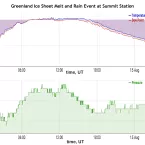Our Research
Related News & Stories

Each September, the National Snow and Ice Data Center (NSIDC) at the University of Colorado Boulder informs the public of the annual Arctic sea ice minimum extent, an indicator of how climate change is affecting the Arctic, the fastest-warming reg
Arctic sea ice extent declined more slowly during August 2021 than most years in the past decade, and as a result, this year’s September minimum extent will likely be among the highest since 2007.
Sea ice loss during the first half of August stalled, though ice in the Beaufort Sea is finally starting to weaken. The Northern Sea Route appears closed off in 2021, despite being open each summer since 2008.


The rate of Arctic sea ice loss was somewhat slow through much of July, lowering prospects for a new record low minimum extent in September.